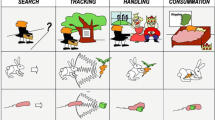Abstract
How does psychology fit into unified science? 1 This question can be discussed even by a non-psychologist, and discussed competently, as long as he is an advocate of unified science, for if the “logical syntax” of the language of science is the same for all the sciences, he finds himself in the position of a physicist who has been working with differential equations on physical phenomena and now proposes to apply them to physiological processes. What would we say to a medical man who rejected this as “meddling by a charlatan” on the ground that his biological curves represented “very special objects” requiring a different mathematics? Just as there is no special mathematical language for medical men, so there is no special scientific language for psychologists.
Access this chapter
Tax calculation will be finalised at checkout
Purchases are for personal use only
Preview
Unable to display preview. Download preview PDF.
Similar content being viewed by others
References
Carnap, Rudolf, Der Raum. Ein Beitrag zur Wissenschaftslehre, Berlin 1922
Carnap, Rudolf, Der logische Aufbau der Welt, Berlin 1928
Carnap, Rudolf, “Überwindung der Metaphysik durch logische Analyse der Sprache” Erkenntnis 2, 219 ff., 1932
Carnap, Rudolf, “Die physikalische Sprache als Universalsprache der Wissenschaft”, Erkenntnis 2, 433 ff., 1932.
Carnap, Rudolf, “Psychologie in physikalischer Sprache”, Erkenntnis 3, 107 ff., 1932.
Feigl, Herbert, Theorie und Erfahrung in der Physik, Karlsruhe 1919.
Frank, Philipp, “Kausalgesetz und Erfahrung”, Annalen der Naturphilosophie 6, 445 ff., 1907.
Frank, Philipp, “Gibt es eine absolute Bewegung?”, Wissenschaftliche Beilage zum 23. Jahresbericht der Philosophischen Gesellschaft an der Universität Wien, Vienna 1910.
Frank, Philipp, “Das Relativitätsprinzip und die Darstellung der physikalischen Erscheinungen im vierdimensionalen Raum”, Annalen der Naturphilosophie 10, 129 ff., 1911
Frank, Philipp, Die Kausalität und ihre Grenzen, Vienna 1932.
Gödel, Kurt, “Über die Vollständigkeit des Logikkalküls der Principia Mathematical”, Monatshefte für Mathematik und Physik 37, 349 ff.
Hahn, Hans, “Über die nichteuklidischen Größensysteme”, Sitzungsberichte der Akademie der Wissenschaften 16, 601 ff., 1907.
Hahn, Hans, Anmerkungen zu B. Bolzanos Paradoxien des Unendlichen, Leipzig 1920.
Hahn, Hans, Überflüssige Wesenheiten, Vienna 1929.
Hahn, Hans, Logik und Wirklichkeit, Vienna 1933.
Neurath, Otto, “Definitionsgleichheit und symbolische Gleichheit”, Archiv für systematische Philosophie, 142 ff., 1910.
Neurath, Otto, “Prinzipielles zur Geschichte der Optik”, Archiv für Geschichte der Naturwissenschaften, 317 ff., 1915.
Neurath, Otto, Empirische Soziologie, Vienna 1931.
Neurath, Otto, “Physikalismus”, Scientia 1931.
Neurath, Otto, “Protokollsätze”, Erkenntnis 1932.
Schlick, Moritz, Raum und Zeit in der gegenwärtigen Physik. Zur Einführung in das Verständnis der Relativitäts- und Gravitationstheorie, Berlin 1917 (4th ed. 1922).
Schlick, Moritz, Allgemeine Erkenntnislehre, Berlin 1918 (2nd ed. 1925).
Schlick, Moritz, “Naturphilosophie” in: Dessoir, ed., Lehrbuch der Philosophie, Berlin 1925.
Schlick, Moritz, “Erkenntnistheorie und moderne Physik”, Scientia, 307 ff., 1929.
Schlick, Moritz, “Die Kausalität in der gegenwärtigen Physik”, Die Naturwissenschaften 19, 145 ff., 1931.
Waismann, Friedrich, “die Natur des Rduzibilitäsaxioms”, Monatshefte für Mathematik und Physik, 143 ff., 1929
Watson, John B., Behaviorism, New York 1924.
Bechterre, W., Allgemeine Grundlagen der Reflexologie des Menschen, Leipzing and Vienna 1926
Hartmann, Heinz, Die Grundlagen der Psychoanalyse, Leipzig 1927
Editor information
Rights and permissions
Copyright information
© 1987 D. Reidel Publishing Company, Dordrecht, Holland
About this chapter
Cite this chapter
Neurath, O. (1987). Unified Science and Psychology. In: Hegselmann, R., Kaal, H., McGuinness, B. (eds) Unified Science. Vienna Circle Collection, vol 19. Springer, Dordrecht. https://doi.org/10.1007/978-94-009-3865-6_1
Download citation
DOI: https://doi.org/10.1007/978-94-009-3865-6_1
Publisher Name: Springer, Dordrecht
Print ISBN: 978-94-010-8218-1
Online ISBN: 978-94-009-3865-6
eBook Packages: Springer Book Archive




